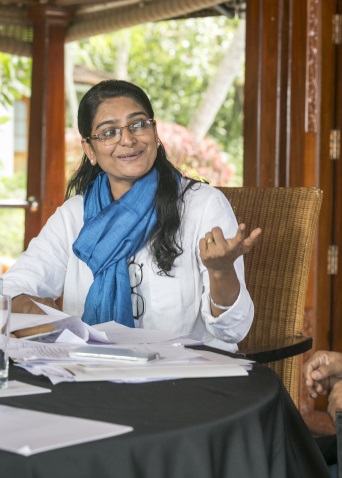Poetry in Berlin


Foto: Goethe-Institut / Roi Sinai
Six poets, six languages.
Originating from the alien worlds of countless existences; worlds that house the living and the non-living; and universes abound in innumerous memories of people, both dead and alive and taking form as expressions - sensual, intellectual, imaginary and metaphysical. Six languages, six poets.
Nicolai Kobus, the animal- tamer of odds and abstractions, the hunter of the daily and the ordinary, the new German poet.
The American Aron Kunin, one of the most minimalist of voices around, sharp and lean, a nothingness having shed everything inessential.
Mohamad Alaaedin Abdul Moula, the Syrian poet émigré in Germany, the Arab voice that breaks in the crescendo of anguish and anger, with eyes that refuse to get wet.
Thorild Wardner, the bird song that flaps its wings, neat and vigorous like the sunlight that falls on Norwegian snow.
Orsolya Kalasz, the poet who cries, whispers, and embraces in both German and Hungarian languages and probes along the solitary paths of darkness and pain.
And I, of Malayalam, the Dravidian language spoken in a strip of land lying at the southernmost tip of the Indian subcontinent that rests its head where three seas merge…
Poetry is an immersion in language. Poetry resides not in mere words; it happens in words that carry strange resonances and unpredictable potencies. Poetry must be, in that sense, the Unicode of humanity. It encodes all history and culture deep within itself. On March 21, at an event organised in Berlin by Literaturwerkstatt on World Poetry Day, in the heart of a city where the history of seven centuries lie deep, six languages congregated to speak to a full audience. It was an unusual assembly of languages in verse, in a world where human languages can behave like human beings, where they turn into rulers and the ruled, predators and the prey. In a world where the politics of power and money is erasing small populations and their languages, and in the process wiping out the history and culture they carry within. In a world where human beings are relegating human beings to obscurity, death, killing the very possibility of memory and acts of remembrance that only language makes possible…
The path Goethe-Institut treads in the pursuit is not a commonly travelled one. I am overwhelmed by the untiring work and enthusiasm of Dr. Thomas Wohlfahrt and Dr. Christiane Lange, of Literaturwerkstatt, bringing poets and poems from all over the world to Germany and back, creating a Babel of poetic exchanges for the last 15 years! In these dark and desperate times, let me assert my belief in this beautiful political act that by default resists the new world order of violence, intolerance and greed!
Originating from the alien worlds of countless existences; worlds that house the living and the non-living; and universes abound in innumerous memories of people, both dead and alive and taking form as expressions - sensual, intellectual, imaginary and metaphysical. Six languages, six poets.
Nicolai Kobus, the animal- tamer of odds and abstractions, the hunter of the daily and the ordinary, the new German poet.
The American Aron Kunin, one of the most minimalist of voices around, sharp and lean, a nothingness having shed everything inessential.
Mohamad Alaaedin Abdul Moula, the Syrian poet émigré in Germany, the Arab voice that breaks in the crescendo of anguish and anger, with eyes that refuse to get wet.
Thorild Wardner, the bird song that flaps its wings, neat and vigorous like the sunlight that falls on Norwegian snow.
Orsolya Kalasz, the poet who cries, whispers, and embraces in both German and Hungarian languages and probes along the solitary paths of darkness and pain.
And I, of Malayalam, the Dravidian language spoken in a strip of land lying at the southernmost tip of the Indian subcontinent that rests its head where three seas merge…
Poetry is an immersion in language. Poetry resides not in mere words; it happens in words that carry strange resonances and unpredictable potencies. Poetry must be, in that sense, the Unicode of humanity. It encodes all history and culture deep within itself. On March 21, at an event organised in Berlin by Literaturwerkstatt on World Poetry Day, in the heart of a city where the history of seven centuries lie deep, six languages congregated to speak to a full audience. It was an unusual assembly of languages in verse, in a world where human languages can behave like human beings, where they turn into rulers and the ruled, predators and the prey. In a world where the politics of power and money is erasing small populations and their languages, and in the process wiping out the history and culture they carry within. In a world where human beings are relegating human beings to obscurity, death, killing the very possibility of memory and acts of remembrance that only language makes possible…
The path Goethe-Institut treads in the pursuit is not a commonly travelled one. I am overwhelmed by the untiring work and enthusiasm of Dr. Thomas Wohlfahrt and Dr. Christiane Lange, of Literaturwerkstatt, bringing poets and poems from all over the world to Germany and back, creating a Babel of poetic exchanges for the last 15 years! In these dark and desperate times, let me assert my belief in this beautiful political act that by default resists the new world order of violence, intolerance and greed!
Anita Thampi
-
is a South Asian poet, who was invited to Germany to celebrate poetry
on World Poetry Day on 21 March 2016.
is a South Asian poet, who was invited to Germany to celebrate poetry
on World Poetry Day on 21 March 2016.



